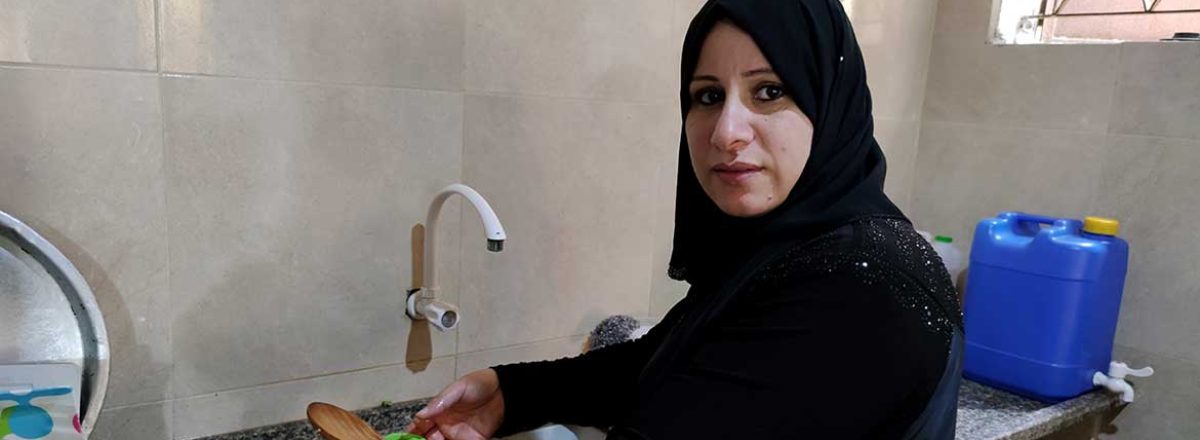
Water in Gaza: Scarce, polluted and mostly unfit for use
Some two million Gazans suffer from a constant shortage of water, which gets worse in summer. The tap water is salty and polluted and is not fit for drinking. In the absence of other alternatives, residents are forced to use this water for bathing and washing, yet the supply is irregular and unpredictable. For drinking and cooking, they no choice to buy water privately – despite severe financial hardship – and even then it is usually substandard.
The shortage of water in the Gaza Strip and the substandard quality of tap water have been known for years. The coastal aquifer, which Gaza relies on as its only water source, has been polluted by over-pumping and wastewater contamination. As a result, 96.2% of household water from the aquifer is non-potable. Moreover, about 40% of the domestic water supply is lost on the way to consumers because of Gaza’s outdated infrastructure. Due to irregularities in supply, residents have to stock water in containers in their rooftops to use on days when the supply is cut off. The power supply in Gaza is also intermittent, and often does not come on at the same time as the water supply. This limits residents’ ability to operate pumps to fill up the containers. Families that do not get a chance to pump water to the roof before the power supply runs out find themselves with no running water.
I feel like it’s almost sewage, not even fit for animals to drink.
From Buthaynah Abu Ghaben's testimony.
The low quality and limited supply of water force Gazans to purchase desalinated water from private vendors, mostly for drinking and cooking but also for other purposes. Much of the purchased water is polluted, too.
The World Health Organization has set the minimum requirement for daily per capita water consumption at 100 liters. This amount should cover basic domestic needs such as drinking, bathing, cooking, and washing. In Gaza, average daily per capita consumption is only 88 liters; in Israel, by comparison, it is more than 200.
Much has been written about the water crisis in the Gaza Strip under the Israeli blockade, about Gaza’s collapsing infrastructure and about Israel’s responsibility for creating this situation. Here, we share the stories of five Gazans who live in this unbearable reality. They describe their constant pursuit of water, the effect of the salty water on their physical and mental health and on their belongings, and the financial burden of buying water they can barely afford.
The following testimonies were given to B’Tselem field researchers Khaled al-‘Azayzeh and Olfat al-Kurd.
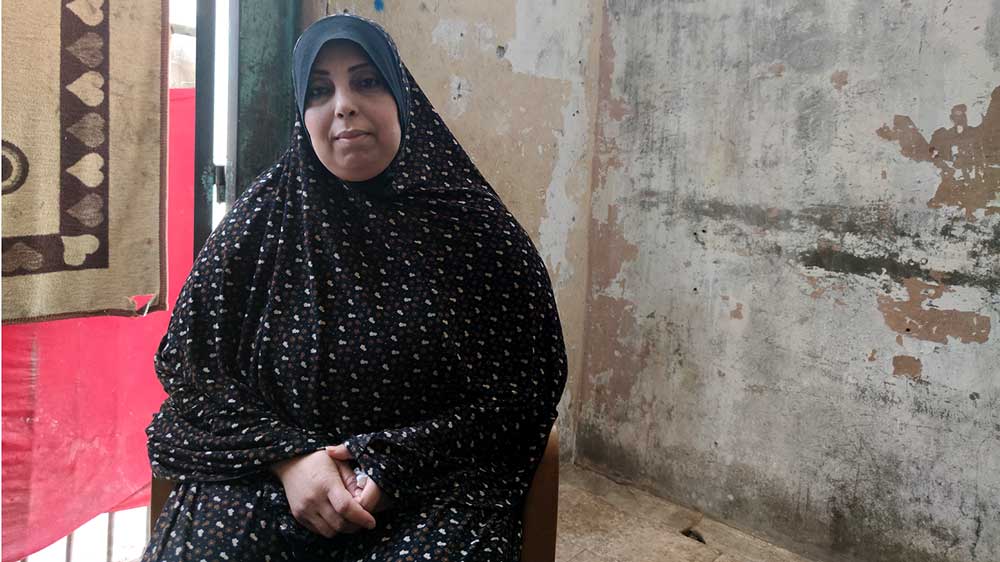
Buthaynah Abu Ghaben (44), a married mother of seven from a-Shati’ Refugee Camp in Gaza City:
We have three sons and four daughters, ranging in age from 10 to 23. We’re both unemployed and live off a stipend of 1,500 shekels (~440 USD) a month in a small 45-square-meter house. The water shortage here in the camp is severe. The water is so salty that you can’t even drink it or cook with it, not to mention laundry or cleaning, but there’s no choice but to use it.
In the summer, we only get water once every two to three days. Because of the power outages, sometimes we don’t have water and electricity at the same time, so we can’t use the pump to get water to the roof. We don’t own a generator, so sometimes my sons and I have to fill up small containers and carry them to the roof. It’s very tiring. Sometimes I stay up all night and wait until the power and water come on to fill the containers.
Sometimes I stay up all night and wait until the power and water come on to fill the containers.
The salinity is a serious problem: when you turn on the faucet, yellowish, rusty water comes out. We only use it for laundry, cleaning and bathing. Our kitchen utensils have gone white from the salt and have a layer of rust. The rust ruins the faucets and I replace them whenever I get the chance. But sometimes I have to make do with them as they are.
I buy drinking water from trucks and use it for drinking, delicate laundry and cooking. Every month I fill up a 250-liter container in my kitchen five times. It costs 15 shekels (~5 USD) every time. It’s a financial burden and sometimes, when I don’t have money, I ask the vendor for credit. In the winter, if I don’t have the money, I stock rainwater for our household needs.
The salty water causes a lot of problems: it damages our hair and fingernails, makes our skin dry and is bad for our teeth and ears. Our eyes and bodies really itch after we shower. My kids complain about the irritation in their eyes and suffer from rashes. My daughters, who are young women, and I suffer from hair loss and our skin is very dry. We don’t have money to buy creams and ointments and have to get by without them. The water isn’t even clean enough to cleanse before prayer. I feel like it’s almost sewage, not even fit for animals to drink.
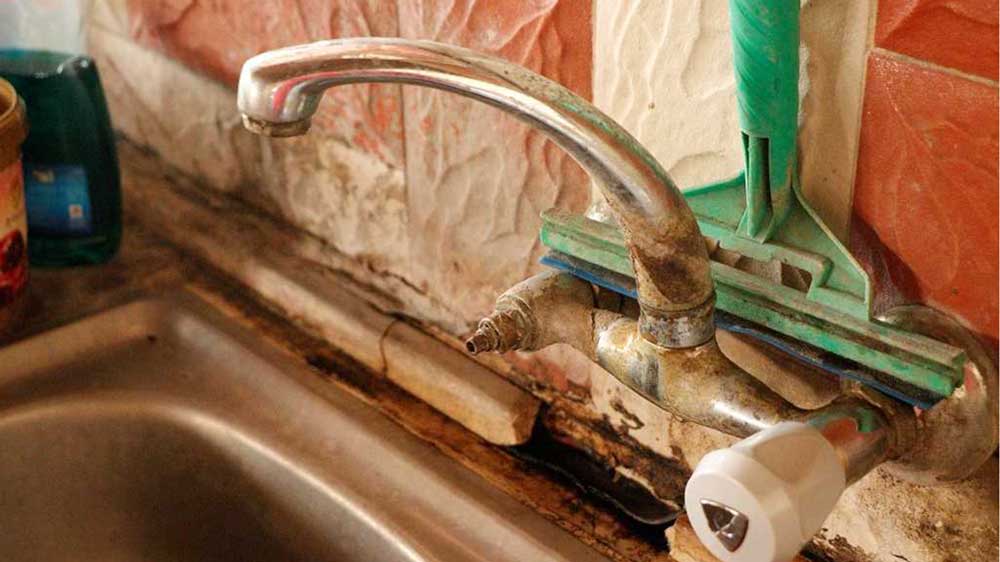
View more photos in Photo Blog
Samira ‘Abd a-Salam (56), a married mother of seven from the neighborhood of Tal al-Hawa in Gaza City:
We have four daughters and three sons. I’m a homemaker and have been living here for 25 years. All these years, I’ve suffered from the salt in the water. Since the blockade started things have become worse, because now there are long breaks in the water and power supply, which are sometimes not even on at the same time. Our building has four stories and about 25 residents. Together, we consume a lot of water.
Every family in the neighborhood has two water containers on the roof, which hold 3,000 liters together. To have enough water we need to fill them up every day, but we only get running water every other day. In the summer, the supply is down to once in three or four days, and sometimes only once a week. Every family also has a container of 1,500 liters in their yard. Whenever we have running water, we first of all fill up these containers. When the power comes on, too, we pump water into the containers on the roof, so every family has to have a pump.
Sometimes we stay up until dawn and wait for the electricity to come on so we can pump water to the roof. I set an alarm clock to wake up when both supplies are on at the same time, and then I’m exhausted the whole day.
The tap water is so salty, you can make pickles with it. As soon as you open the faucet, you see that it’s dirty, salty and not fit for use. Still, we have no choice but to use it, even though it’s bad for us. It makes our hair coarse and dry and fall out more. My daughter Samar (32) had a rash and the doctor said it was from the water. It also makes our eyes red and irritated, and my husband gets severe eyelid infections from it. To wash our faces, we fill up a bottle with drinking water.
The tap water is so salty, you can make pickles with it. As soon as you open the faucet, you see that it’s dirty, salty and not fit for use.
Because of rust and calcium residues, we have to change the faucets and pipes once a while. We switched all the plumbing in the house to plastic because it rusted so often. The toilet tanks and siphons became clogged, so we had to replace them. It costs us a lot of money and is especially tough now, because of our financial situation. The water also damages household appliances such as kitchen utensils. I keep pouring citric acid and vinegar into the washing machine to clean the pipes from calcium and rust, but there’s still a lot of wear and tear. I wash my black clothes in fresh water so they don't get ruined.
We buy our drinking water from trucks that come to the neighborhood. Every week, I fill up a container of 250 liters I keep on the balcony. The water costs us about 40 to 50 shekels (~12-15 USD) a month, which is a significant expense, and that’s just for drinking and cooking. We live on the second floor, and sometimes the truck owner refuses to send the water up to the balcony because he says he doesn’t have enough fuel. When the power’s on, we can use our pump. So I lower him a rope, he ties the hose, I pull it up and put it in the container, then he lets the water out. The hose is long and heavy.
Every year and especially in summer, when we need more water, I get anxious because of the shortage. I hope the supply and salinity problems will be solved one day, because I’m worried and exhausted from dealing with it. But I’m not optimistic. The occupation authorities want to pressure us and wear us down.
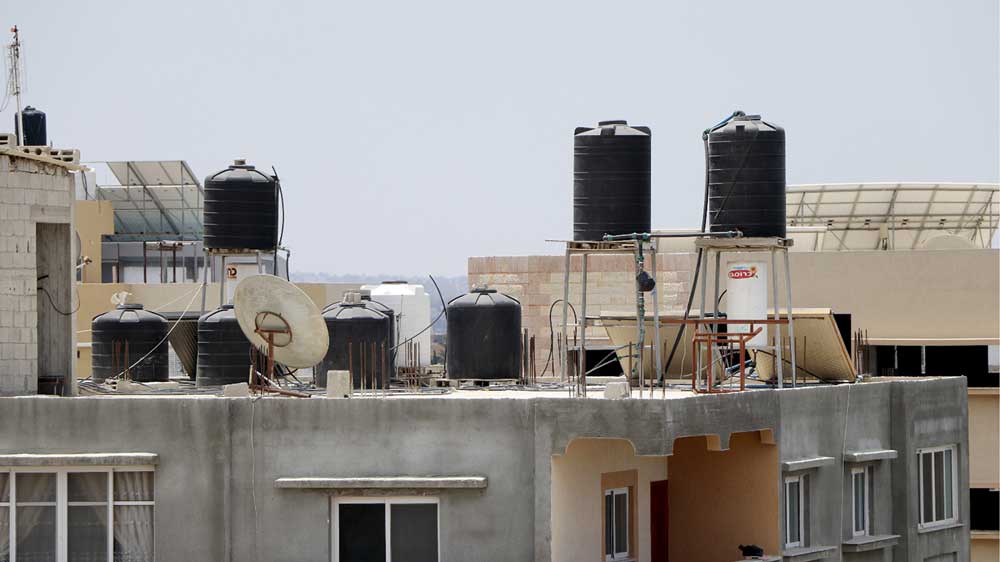
Hassan Abu Yusef (42), unemployed, a married father of three from a-Nuseirat Refugee Camp:
My wife and I have three children – ‘Ali (12), Sara (7) and Yusef (2.5). I’m unemployed and live in a-Nuseirat Refugee Camp. For many years, we’ve been suffering from water shortages that last several days a time. It gets worse in summer. I keep three water containers on the roof: one can hold 1,500 liters, another 1,000 liters, and the third 500 liters. I fill them up when there’s water in the taps. The problem is that the water flow is weak, so I have to use an electrical pump to get the water up to the roof. But even when the water’s running, the power doesn’t always work at the same time. Sometimes, we have neither.
I’m constantly thinking about the water problem. Even when I’m out of the house, I’m always in touch with my wife to make sure she turned on the pumps and to ask whether the power and water are on at the same time. We ration the water so we don’t run out. We only use tap water for laundry, bathing and dishwashing. I buy our drinking and cooking water separately. I have one 500-liter container and I fill up less than half of it, because I don’t want the fresh water to stay in it for long. Every two weeks or so, I pay 10 shekels (~3 USD) for 250 liters of fresh water. But in the summer we drink more, and I have to buy that amount about once a week.
I’m constantly thinking about the water problem. Even when I’m out of the house, I’m always in touch with my wife to ask whether the power and water are on.
According to the supply schedule in our area, we’re supposed to get water on Sundays, Tuesdays, and Thursdays, but the hours are irregular. On those days, we take turns checking the taps for water. Sometimes, my wife stays up at night to wait for it and then turns on the pump and fills the containers. Only then can she do the laundry and clean the house. If something goes wrong with the schedule, so, for instance, we don’t get running water on Tuesday, we won’t get it until Thursday. In that case, my wife has to put off doing laundry until we have enough water for other needs. If we don’t get it by Thursday, I have to buy expensive desalinated water, which costs between 30 to 50 shekels (~9-15 USD), to fill up the large containers and use the water for bathing and cleaning, too.
The tap water is salty and not fit for drinking. Sometimes the salinity is so high that it’s gray. It has a lot of chalk and limestone in it, which ruins the faucets. Every so often I need to replace them. The salt water is also bad for hair, so when I take a shower, I put a jerrycan of fresh water next to me. After I finish showering, I wash my hair and other sensitive parts with water from the jerrycan.
Because of the salt in the water, the electrical pump often breaks down and the containers gather so much rust that I have to call a plumber to fix them. When that happens, I use the opportunity to clean them and often find mud and sand at the bottom.
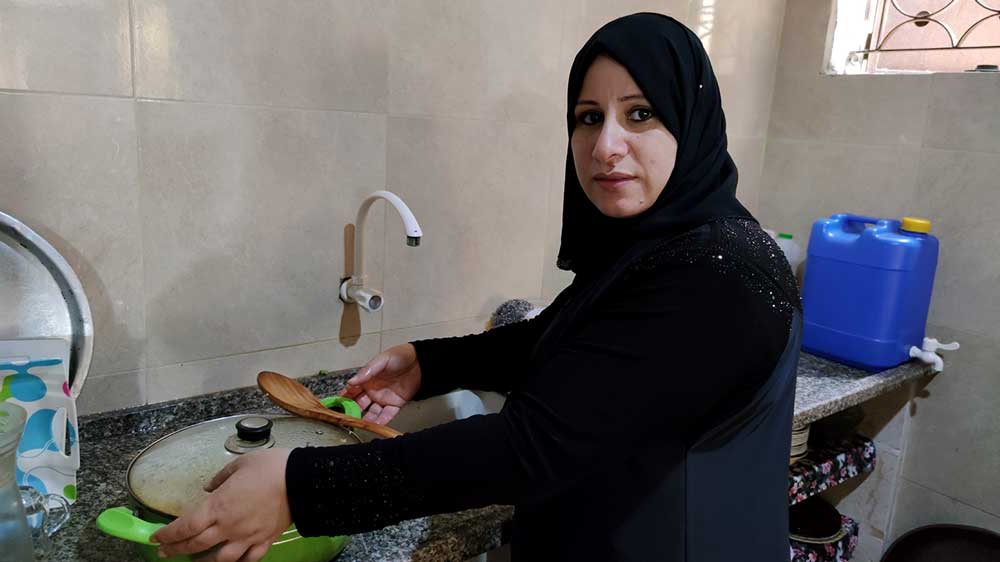
Hala al-Kahlut (39), a married mother of four from the neighborhood of a-Sheik Radwan in Gaza City:
We have two daughters and two sons: Saly (18), Malak (16), Husam (15) and Muhannad (12). We’ve been suffering from problems with the water supply for years: the salinity, the irregular supply, and the lack of coordination between the water and power supplies. Sometimes we’re stuck without water for three or four days in a row. At other times, we have to stay up all night to wait for the water supply to come on and use the opportunity when the power is also on, or else we can’t fill the containers on the roof. When there’s no water in the house, I feel really distressed. If I had to choose, I’d rather make do without electricity and have water all the time. Water is life and without water in my home, I feel hopeless and exhausted.
The main problem is the salinity of the tap water. It’s unfit for bathing, drinking or cooking. I have no choice but to use it for bathing and daily housework. I buy drinking water from trucks that go around the neighborhood. Every week, I fill up a container of 250 liters, which costs 10 shekels. I fill it four times a month and use the water for cooking, baking, coffee and tea.
When you open the faucets, the water comes out with a yellowish tint. It makes our hair coarse and our scalps itch. Our eyes go red and we feel the irritation after the shower, especially my kids. Our skin also becomes very dry.
If I had to choose, I’d rather make do without electricity and have water all the time. Water is life and without water in my home, I feel hopeless and exhausted.
The salty water also damages the pipes, which accumulate rust and residues of calcium and every few months, I have to change them. I recently changed them to plastic, in the hope they’ll last longer. Every three or four months, I have to change parts of the washing machine that are ruined by the water. Because of the saltiness, our clothes come out stiff from the wash and after a while, they crumble and tear easily.
We’re suffering very much from this situation, and I can’t wait for it to end. I look forward to the day we’ll get a steady supply of water and power and the tap water will be sweet. Meanwhile, we have to buy drinking water separately, but even that's not really fit for use.
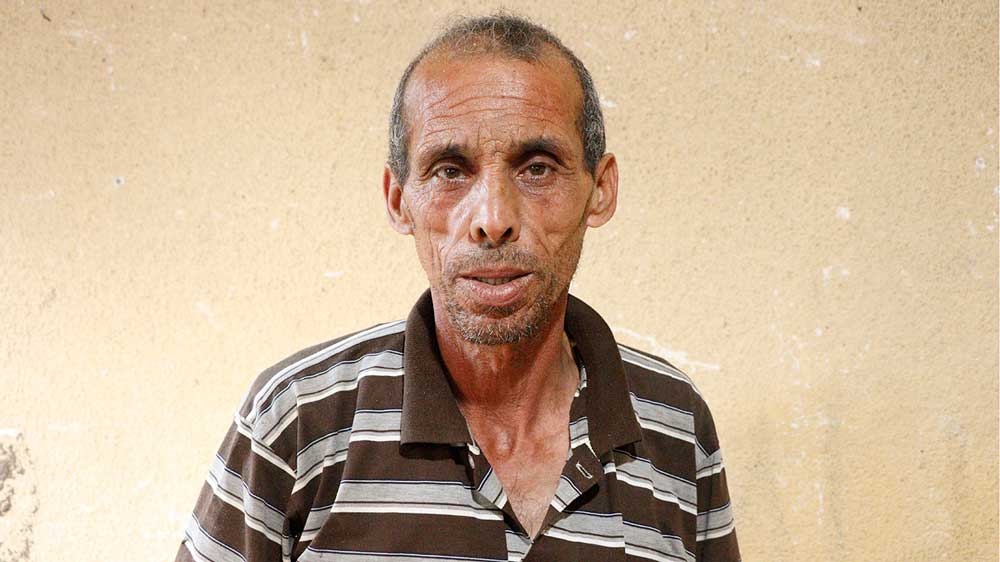
Hatem Hamed (53), unemployed, a married father of six from a-Zawaydah:
We have three sons and three daughters. I’ve been unemployed for 13 years and we live in a small tin-covered house near the a-Zawaydah towers, north of Deir al-Balah. The water supply only reaches us once every four days, for about six hours at a time. When the water’s running, the flow is weak and the water is very salty. I wait for the water the whole week and check the taps often. Sometimes, I leave the faucet open to hear when the water comes back.
I have a water container with a volume of 500 liters by the house, and two more 1,000-liter containers on the roof. If the water comes on while the power’s off, I can only fill up the small container in the yard. When the power’s on, I can pump that water up to the roof, but then we’re only left with 500 liters. If the containers empty before the supply comes back on, I buy drinking water for about 30 shekels (~9 USD) per cubic meter, and we fill them with it. That happens mostly in summer, when we consume more water.
When you bathe, you don’t feel that the soap is really cleaning anything, and the washing machine needs a lot of powder to do anything.
The tap water is very salty and not fit for human use. We have no choice but to use it for bathing, dishwashing and laundry. My daughters wash their hair in the drinking water because the salt harms it. Before prayers, I use tap water to cleanse myself and then wash my mouth. I really can’t stand the taste.
The faucets in the house are all in a bad state, because they’re full of limestone and rust. The moment something needs fixing and you take it apart, everything breaks. Even the toilet bowl gets ruined by the salt and can break when you clean it. All of that costs a lot to fix, and I have no income.
When you bathe, you don’t feel that the soap is really cleaning anything, and the washing machine needs a lot of powder to do anything. My son Jamal (30) learned how to make homemade washing powder and cleaning products to save us money. The salt also damages our clothes, which wear down soon after we buy them.
The salty water is not even suitable for agriculture. I’ve planted fruit trees such as figs, grapes and citrus fruit again and again, but they don’t grow beca

هیچ نظری موجود نیست:
ارسال یک نظر